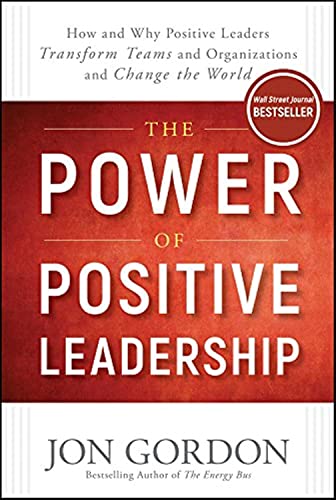Positive Leadership

Jon Gordon is an expert on the power of positive leadership. He learned the hard way that negativity doesn’t work, and he wrote an excellent book called “The Power of Positive Leadership.” I have enjoyed reading his books, blogs, and hearing some of his talks over the years. He offers incredible insight and hope to leaders in all different sectors. We all know that we live in a very cynical and negative world. All of us must make the decision to stay positive when we face adversity. Mindset and attitude always matter. I find these ten principles by Gordon to be very interesting and applicable and wanted to pass them along.
1. People follow the leader first and the leader’s vision second. It doesn’t matter if the leader shares a powerful vision, if the leader is not someone who people will follow, the vision will never be realized. As a leader, who you are makes a difference. The most important message you can share is yourself.
2. Trust is the force that connects people to the leader and his/her vision. Without trust, there is a huge gap between the leader and the vision. Without trust, people will stay off the bus. However, if people trust the leader they will hop on the bus with the leader and help move the bus forward toward the vision.
3. Leadership is not just about what you do but what you can inspire, encourage and empower others to do.
4. A leader brings out the best within others by sharing the best within themselves.
5. Just because you’re driving the bus doesn’t mean you have the right to run people over. Abraham Lincoln said “Most anyone can stand adversity, but to test a man’s character give him power.” The more power you are granted the more it is your responsibility to serve, develop and empower others. When you help them grow they’ll help you grow.
6. “Rules without Relationship Leads to Rebellion.” Andy Stanley said this and it’s one of my favorite quotes. As a leader, you can have all the rules you want but if you don’t invest in your people and develop a relationship with them they will rebel. This applies amazingly to children as well. It’s all about relationships.
7. Lead with optimism, enthusiasm, and positive energy, guard against pessimism, and weed out negativity.
8. Great leaders know they don’t have all the answers – rather they build a team of people who either know the answers or will find them.
9. Leaders inspire and teach their people to focus on solutions, not complaints.
10. Great leaders know that success is a process, not a destination. One of my heroes John Wooden, the legendary UCLA basketball coach, never focused on winning. He knew that winning was the by-product of great leadership, teamwork, focus, commitment, and execution of the fundamentals. As a leader, focus on your people and process, not the outcome. (Jon Gordon)
As we continue to make our way through Mark’s gospel during the Lenten season, let’s also remember the words and example of Jesus: “Those who want to be great must be your servant.” Humility and optimism are both important assets.
Recommended Posts

Easter, Baptisms, & Commitment Sunday
April 23, 2025

Easter Brings New Life!
April 16, 2025

Generous Hearts
April 11, 2025

